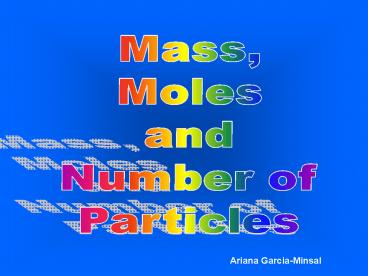Mass, PowerPoint PPT Presentation
1 / 17
Title: Mass,
1
Mass, Moles and Number of Particles
Ariana Garcia-Minsal
2
Moles
Mass
Number of Particles
3
What is the mass in grams of 3.50 mol of the
element copper, Cu?
Possible conversion factors
Given information 3.50 mol Cu
63.54 g
1 mol
1 mol
6.02x1023 atoms
3.50 mol Cu x
222.39 g Cu
222 g Cu
3 sign. fig.
4
A chemist plans to use 435 g of iron (Fe). How
many moles of Fe is this?
Possible conversion factors
Given information 435 g Fe
1 mol
55.85 g
1 mol 6.02x1023 atoms
435 g Fe
7.79 mol Fe
x
7.788719785 mol
3 sign. fig.
5
How many moles are there in 3.04x1026 molecules
of hydrogen, H2, gas?
3.04x1026 molecules H2
505 moles
x
504.9833887 moles
3 sign. fig.
Possible conversion factors
1 mol 2 g H2
1 mol
6.02x1023 molecules
6
How many phosphorus atoms are there in 1.75 mol
of phosphorus?
1.75 mol
1.0535x1024 atoms
1.05x1024 atoms
x
1 mol 31 g P
1 mol
6.02x1023 atoms
7
What mass of sulfur is needed to have 5.6x1025
atoms of sulfur?
5.6x1025 atoms
3.0x103 g S
x
x
2976.744 g S
2980
3000
1 mol
32 g S
1 mol
6.02x1023 atoms
8
Moles
Mass
Number of Particles
9
The magnitude of Avogadro's number
If 6.02x1023 snowflakes fell evenly throughout
the United States, the blanket of snow would
cover up every building in the country,
including the tallest skyscrapers
6.02x1023 dollars would be enough to guarantee
every person on earth an income of 3 million
per second for a hundred years
If everyone of the 6 billion people living on
earth attended a pizza party with 6.02x1023
pizzas, and each person present downed a
pizza every 3 minutes, it would take 600 million
years to consume the pizza
A modern computer that can make 100 million
counts per second would need almost 200 million
years to count up to 6.02x1023
If you could travel at the speed of light, it
would take you more than 100 billion years to
travel 6.02x1023 miles
10
Percent Composition
- Percent of each element a compound is composed
of. - Find the mass of each element, divide by the
total mass, multiply by a 100. - Easiest if you use a mole of the compound.
- Find the percent composition of CH4
11
Percent Composition
Mass of 1 mol of C 12.01 g Mass of 1 mol of H
1.00 g but there are 4 moles of H in CH4 Mass
of 4 moles of H 4.00 g Mass of 1 mol of CH4
16.01 g C 12.01 x 100 75.02
16.01 H 4.00 x 100 24.98 16.01
12
Percent Composition
- Al2(Cr2O7)3
- CaSO4 2H2O
13
Calculate the percent composition of a compound
when 6.48 g sample of N is reacted with oxygen to
give 25.00 g of the compound.
Mass of N 6.48 g Mass of O 25.00 g 6.48 g
18.52 g Total mass of sample 25.00 g
N 6.48 g x 100 25.9 25.00
O 18.52 g x 100 74.1 25.00
Notice that the sum of all percents equal 100
14
Empirical formula
- From percent composition, you can determine the
empirical formula. - Empirical Formula the lowest whole number ratio
of moles of atoms in a molecule. - Based on mole ratios.
- A sample is 59.53 C, 5.38H, 10.68N, and
24.40O what is its empirical formula.
15
Empirical formula
Step 1. Assuming 100 g of sample 59.53g C
5.38g H 10.68g N 24.40g O
16
Empirical formula
Step 2. Convert the mass to moles 59.53g C x 1
mol 4.961 mol 12.0 g 5.38g
H x 1 mol 5.38 mol 1 g 10.68g
N x 1 mol 0.7629 mol 14.0
g 24.40g O x 1 mol 1.525 mol
16.0 g
17
Empirical formula
Step 3. Find the lowest whole number ratio of
moles of atoms by dividing by the lowest number
of moles. 4.961 mol C 0.7629 6.502 6.5 5.38
mol H 0.7629 7.05 7 0.7629 mol N 0.7629
1.000 1.525 mol O 0.7629 1.999 2
The empirical formula is found to be
C13H14N2O4

